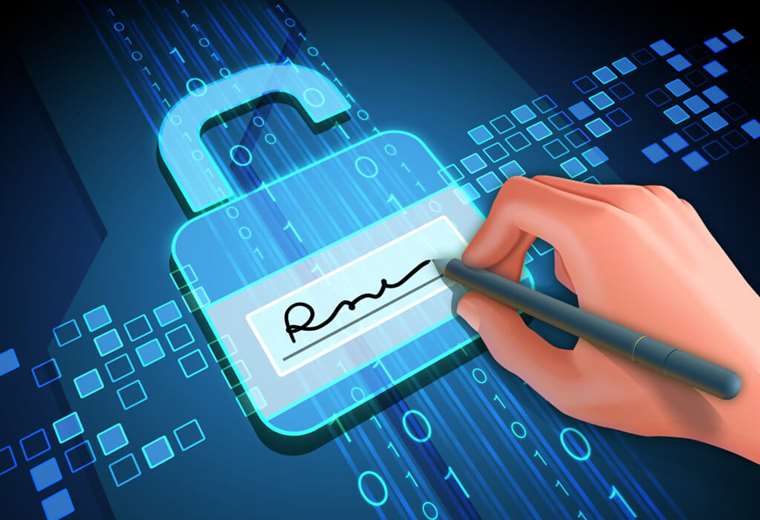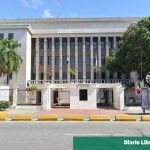March 7, 2023, 10:28 AM
March 7, 2023, 10:28 AM
Digital signatures are a technological solution that seeks to give security and confidence to electronic documents. can be used for authenticate a user in systems of many public institutions. Through this instrument, the documents acquire legal value and probative character, by allowing the creation of files with more security than the handwritten signature.
By using the digital signature, the use of paper and bureaucracy in state institutions is reduced.
The digital signature according to Law 164 “is the electronic signature that uniquely identifies its owner, created by methods that are under the absolute and exclusive control of its owner, susceptible to verification and is linked to the data of the digital document in such a way that any modification of the same evidences its alteration”.
To achieve this, the National Digital Certification Infrastructure was created through which the issuance of digital signature certificates is carried out that, using cryptography, has a digital signature.
Through Law 164 and its regulatory decree, it was sought to guarantee that the digital signature has the principles of ‘Authenticity’, ‘Integrity’ and ‘Non-repudiation’, giving the signatory security that if he signs a document and another person arrives to alter that document will invalidate the signature of the document. Likewise, the identity of another person could not be impersonated since the identity is associated with the digital signature certificate issued by an authorized certifying entity.
For Alberto Inch, an expert in technology and development from the Agency for the Development of Information in Bolivia (ADSIB), the country took a very important step with the promulgation of Law 164 and DS 1793. Since then, ADSIB has been a Certifying Entity Authorized has promoted the use of this technology, together with important players such as the National Customs. Inch highlights that another equally important norm was DS 3525 through which the obligation for public entities to receive and process digitally signed documents is established, thus allowing citizens to use this tool in their procedures with the State.
“To date, the Digital Signature is a widely disseminated tool used by both the public and private sectors. However, there is still the fear of change, on the one hand, because basic knowledge of how to use a computer is required. And although it is an easy-to-use tool, it raises doubts as to how it works as it is not linked to the autograph, but directly to the identity of the person”, points out the ADSIB specialist.
According to Inch, the biggest challenge is to overcome the fear that new technologies always have, and this will happen as more people use it, “and for this it would be important to enable, for example, virtual windows in a greater number of institutions for the reception of documents with digital signature through a web page, as an alternative to the physical document reception window”.
Inch points to sectors such as exporters, officials from administrative areas in public entities and all those who had to interact with systems that already incorporate digital signatures in their processes such as online electronic invoicing; as those who should adopt the digital signature.
Regarding the advances of the Digital Signature in private companies, Scarlett Menacho Eyzaguirre, lawyer and professor at the Domingo Savio Private University (UPDS) points out that since the Covid-19 emergency, the companies intensified their registration in the ADSIB, cin order to comply with the demands of public entities that required it, such as Customs, National Taxes, Seprec and others.
Among the main obstacles that prevent Digital Signatures from advancing in the private system, Menacho observes that there is still distrust for the use of this technology, “however, companies and civil society that issue electronic invoices must have their signature registered digital, so that gradually all private companies or people who carry out trade or provide some type of service will be forced to use it”.
Menacho assures that the incorporation of the Digital Signature is a tool to modernize and increase the productivity of the company, it reduces bureaucracy, they can better control their processes and reduce the time in their execution, which also increases their competitiveness in the market”.
ICTs and their contribution to the transformation of Justice
Armando Corral Davezies, national head of the Information and Communication Technologies (ICT) Unit of the Attorney General’s Office, points out that since October 2018, his institution began a process of digital transformation, implementing the Justicia Libre (JL) Electronic Government Ecosystem. . “This model provides transparent services, which prioritize and facilitate care for internal and external users, eliminating bureaucratic practices, and making the service effective; It began with the implementation of the comprehensive case management platforms, the digital portfolio, electronic applications, and the agreement system ”he affirms.
According to Corral, the State Attorney General’s Office already has more than 19 million procedural activities, 70,000 users who access between procedural subjects and litigants, 13 million views of the electronic notebook, 9 million documents approved or digitally signed, among others, in a 100% electronic environment “and all with full legal validity through digital citizenship mechanisms. Corral highlights that the Prosecutor’s Office is the only institution that has complied 100% with the technological requirements set forth in Law 1173.
How to obtain the Digital Signature?
If it is done with a certificate issued by a certifying entity authorized by the ATT as established by Law 164, it is legally valid only with its application. The cost and validity period will depend on the policies of the Certifying Entity that issued it. In ADSIB, the digital signature certificate is issued for one year at a cost of Bs. 70 and the user can sign all the documents that he needs.


















